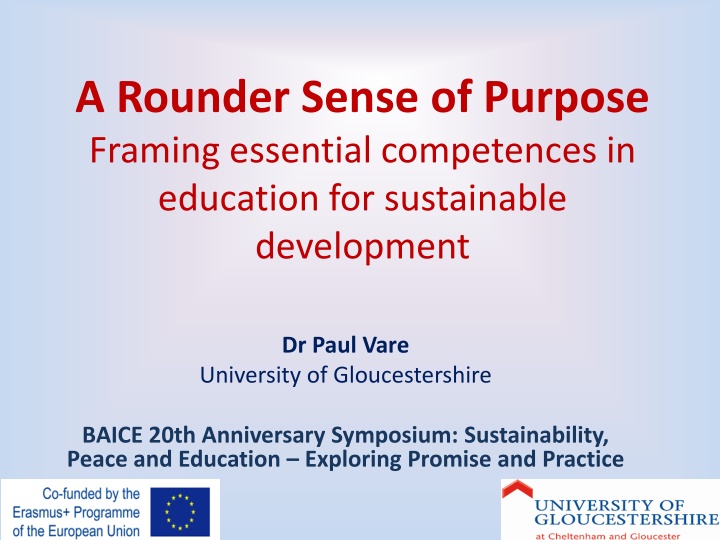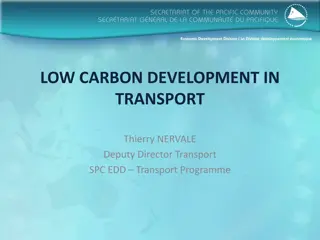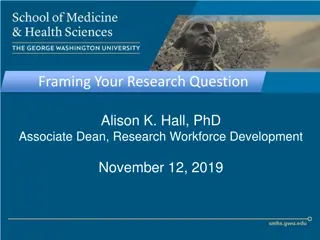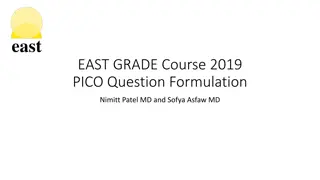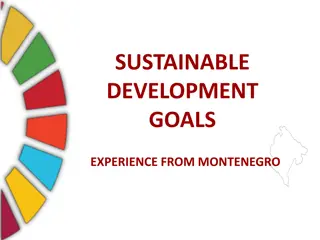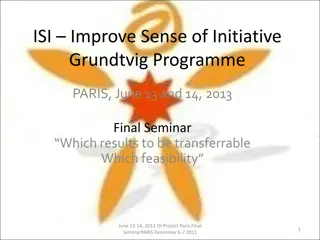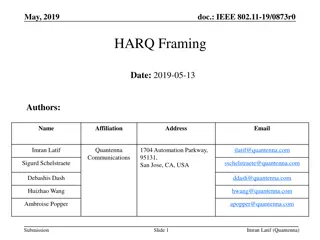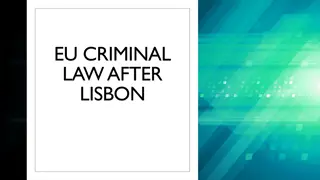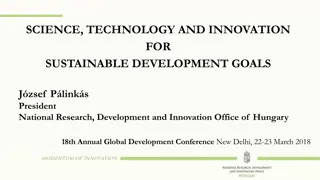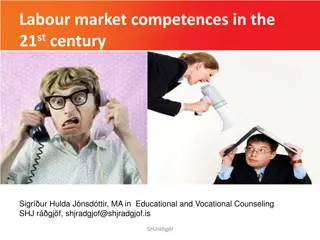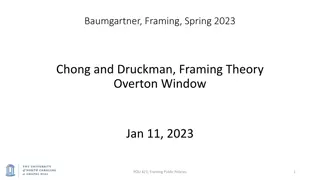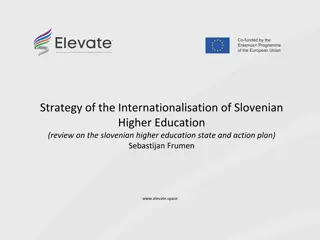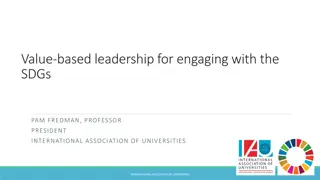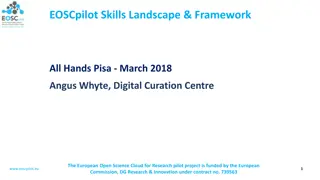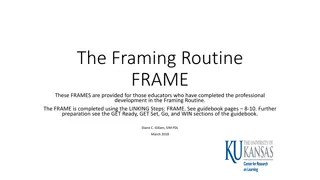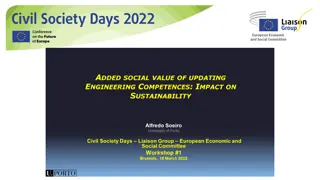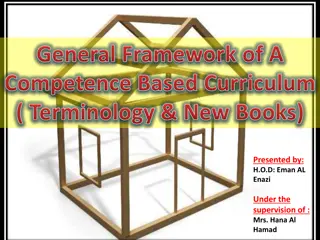Framing Essential Competences in Education for Sustainable Development
This presentation discusses essential competences in education for sustainable development, highlighting 12 key competences distilled from the UN Economic Commission for Europe. Educators play a crucial role in helping learners understand interconnected systems, envisioning change, achieving transformation, and fostering responsible and innovative actions towards sustainability.
Uploaded on Mar 01, 2025 | 1 Views
Download Presentation

Please find below an Image/Link to download the presentation.
The content on the website is provided AS IS for your information and personal use only. It may not be sold, licensed, or shared on other websites without obtaining consent from the author.If you encounter any issues during the download, it is possible that the publisher has removed the file from their server.
You are allowed to download the files provided on this website for personal or commercial use, subject to the condition that they are used lawfully. All files are the property of their respective owners.
The content on the website is provided AS IS for your information and personal use only. It may not be sold, licensed, or shared on other websites without obtaining consent from the author.
E N D
Presentation Transcript
A Rounder Sense of Purpose Framing essential competences in education for sustainable development Dr Paul Vare University of Gloucestershire BAICE 20th Anniversary Symposium: Sustainability, Peace and Education Exploring Promise and Practice
Six partner institutions aiming to: develop a practical accreditation model that teacher educators can use in any European context so that pre- and in-service educators can demonstrate their competence in ESD through a widely-recognised qualification. 3
The United Nations Economic Commission for Europe (UNECE 2012) Defined 39 competences . (Sleurs 2008) We distilled the 39 UNECE competences Refining, filtering, extracting the essential elements to define 12 competences (Also using Wiek et al 2011 & Roorda 2012) 4
Thinking Holistically Envisioning Change Achieving Transformation Integration: Systems Competence The educator helps learners to develop an understanding of the world as an interconnected whole and look for connections across human and natural worlds and consider the consequences of our actions. Futures Competence The educator uses a range of techniques to help learners explore alternative possibilities for the future and to use these to consider how our behaviours might need to change. Participation Competence The educator contributes towards changes in education that will help sustainable development and encourages their learners to do the same. Involvement: Attentiveness Competence The educator alerts learners to fundamentally unsustainable aspects of our society and the way it is developing and conveys the urgent need for change. Empathy Competence The educator is considerate of the emotional impact of the learning process on their learners and develops their self-awareness. Engagement Competence The educator works flexibly and responsively with others, remaining aware of their personal beliefs and values, and encourages their learners to do the same. Practice: Transdisciplinarity Competence The educator acts collaboratively both within and outside of their own discipline, role, perspectives and values and encourages their learners to do the same. Innovation Competence The educator takes an innovative and creative approach using real world contexts wherever possible. Action Competence The educator focuses on the development of learners critical thinking skills and helps them to take considered actions in their own context Reflection: Evaluation Competence The educator helps learners to critically evaluate the relevance and reliability of assertions, sources, models and theories. Responsibility Competence The educator acts transparently and accepts personal responsibility for their work and encourages their learners to do the same. Decisiveness Competence The educator acts in a cautious and timely manner even in situations of uncertainty and encourages their learners to do the same.
Example: Futures Competence The educator uses a range of techniques to help learners explore alternative possibilities for the future and to use these to consider how our behaviours might need to change. Learning objectives The educator helps learners to 5.1 Envision creatively and critically a range of possible or thinkable futures and their sustainability aspects, sharing and debating ideas, worldviews and possible evolutions; focusing near and far, moving flexibly between short and long term goals and perspectives 5.2 Recognise relations and possible evolutions between past, present, near future and far future worldviews, developments and actions 5.3 Anticipate how sustainability problems might evolve or occur over time, considering inertia, path dependencies and triggering events, critically assessing processes of change in society 6
Connections? with? the? Learning? Objectives? of? this? competence? Underpinning? Components? In? order? to? achieve? the? above? Learning? Objectives? the? educator? should? be? able? to:? UC? 5.1a? ? Facilitate? others? to? imagine? different? future? scenarios? and? consider? whether? they? are? sustainable? ? UC5.1b? Understand? how? the? world? might? change? as? we? project? into? the? future? and? how? these? changes? might? be? seen? from? different? perspectives? UC5.2a? Explain? how? changes? that? take? place? are? linked? to? past? actions? and? evolve? over? time? UC5.2b? Analyse? and? look? for? causes? of? change? from? different? perspectives? ? UC5.3a? Think? creatively? about? possibilities? for? the? future? and? critique? suggestions? ? UC5.3b? Share? and? debate? ideas,? suggestions? and? worldviews.? ? 5.1? 5.1? 5.2? 5.2? 5.3? 5.3? ?
Example? Activities? My? vision? of? the? future? Title? Technique? used? (e.g.? research,? simulation,? debate)? Aim? of? activity? Connection? with? underpinning? components? (from? same? competence)? Visioning? exercise? with? discussion? To? help? students? imagine? positive? alternatives? for? a? sustainable? futures? UC? 5.1a? ? Facilitate? others? to? imagine? different? future? scenarios? and? consider? whether? they? are? sustainable? UC5.1b? Understand? how? the? world? might? change? as? we? project? into? the? future? and? how? these? changes? might? be? considered? from? different? perspectives.? ? (To? be? completed? when? all? templates? are? filled)? Connection? with? underpinning? components? (from? other? competences)? Short? description? (10? lines? max)? ? ? Close? your? eyes? and? sit? in? silence? ? relax.? Now? listen? for? 10-15? minutes? while? someone? asks? you? to? imagine? yourself? in? 30? years? time? but? imagine? it? is? a? positive? future ?
At any academic Level we suggest three stages of achievement Stage? 1? Stage? 2? Stage? 3? Participation? in? a? given? programme? Demonstrate? engagement? with? each? of? the? competences? in? practice.? Show? either:? a)How? you? have? brought? about? change? in? others? and/or? in? a? place? of? work? b)A? series? of? critical? reflections? on? the? ESD? competence? framework.? ?
Thoughts? How do/would you approach educating tomorrow s educators?
pvare@glos.ac.uk Thank you!
References Roorda N (2012) Fundamentals of Sustainable Development. London: Earthscan Sleurs W (ed.) (2008) Competencies for ESD teachers. A framework to integrate ESD in the curriculum of teacher training institutes, Brussels Online at: http://platform.ue4sd.eu/downloads/CSCT_Handbook_11_01_08. pdf Wiek A, Withycombe L, and Redman C L (2011) Key Competencies in Sustainability: A Reference Framework for Academic Program Development in Sustainability Science 6(2): 203 18. UNECE (2012) Learning for the future: Competences in Education for Sustainable Development. Geneva: United Nations Economic Commission for Europe
